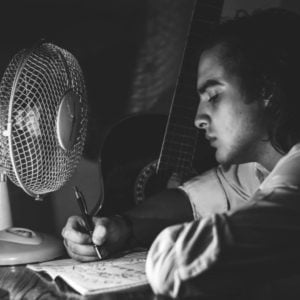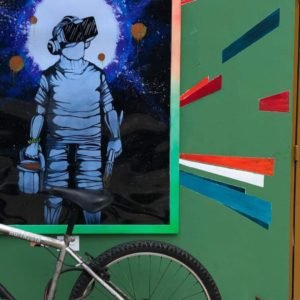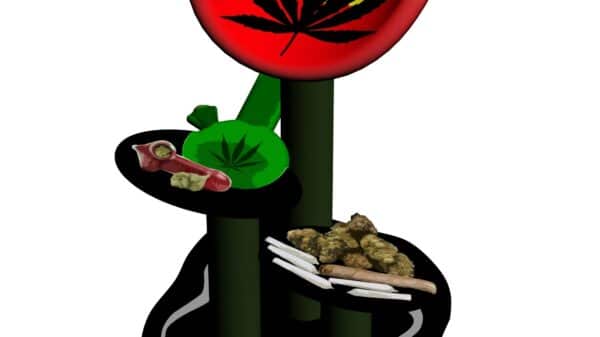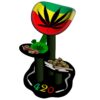LSD, Acid, Blotter, Mellow Yellow or even Window Pane is a hallucinogenic drug that is used as a recreational party drug, spiritual awakening and self-actualisation. Lysergic Acid Diethylamide was synthesized in 1938 by a Swiss chemist named Albert Hofmann, he was doing research into the medicinal properties of ergot alkaloid derivatives. Five years later, on 19 April 1943, the same chemist embarked on the world’s first deliberate hallucinogenic trip. Today, the 19th of April is celebrated as Bicycle Day, in commemoration of Hofmann, the discovery of his ‘Problem Child’ and the faithful bike ride that fueled the hippie movement.
Hunter S Thompson penned the following instructions for the enjoyment of Acid; “try half a cube at first, just sit in the living room and turn on the music – after the kids have gone to bed. But never take it in uncomfortable or socially tense situations. And don’t have anybody around whom you don’t like”.

LSD is a NON-ADDICTIVE mind-altering drug that affects your thoughts, feelings and awareness. Dependencies associated with LSD are brought on by the psychological dependence or need to experience the effects. Users generally start feeling the effects 30 minutes after consumption, which could last up to 20 hours. These effects include visual and auditory hallucinations, dilated pupils and increased body temperature. The recreational use of acid is very unpredictable and should always be taken with caution. Overdose deaths by LSD are not common, the most reported incidents are associated with accidental or reckless behaviour while under the influence.
WHAT IS LSD
Lysergic Acid Diethylamide was created by Albert Hofmann in 1938 at the Sandoz Laboratories in Basel, Switzerland. The chemist made his discovery while investigating the medicinal value of lysergamide class compounds. A group of Amides of lysergic acids that includes compounds with potent agonist and antagonist activity in various serotonin and dopamine receptors.
Pure LSD is a crystalline clear liquid with no smell and a slightly bitter taste, produced in a laboratory using precursors that naturally occur in nature. It can be ingested orally as a capsule, tablet or soaked onto absorbent paper with colourful prints and cut into dosage units.
LSD, like other psychedelic substances such as Magic Mushrooms, Mescaline and DMT, has shown to be an effective therapy for individuals with treatment-resistant major depressive disorders. Psychedelic therapy has also proven to be a game-changer as a breakthrough treatment for addiction, depression and PTSD.

HOW DOES LSD WORK
It is thought that the characteristic hallucinogenic effects of Acid are caused when the drug interacts with the serotonin and dopamine receptors in the brain. The serotonin neurotransmitter is in charge of controlling your behaviour, general mood and moderate your thought of self-doubt. Dopamine on the other hand plays an important role in the motivational or expectancy component of reward-motivated behaviour.

The LSD reaches the brain rapidly where it acts on the Central Nervous System (CNS) and the Autonomic Nervous System (ANS). Acid reacts differently from person to person, the golden rule of psychedelics is to always start low and go slow. The onset of effects can generally be felt 30 minutes to an hour after ingesting the drug, it can peak for two to four hours and could last for up to 12 hours or more. The extent of the effects is related to the dosage and frequency of use by an individual, meaning every person will experience the effects of a similar dosage differently.
HOW DOES LSD MAKE YOU FEEL
Generally, Acid makes you feel happy, creative and confident. You can hear colours and see sounds! The drug brings on bright hallucinations, heightened senses, increased awareness, mind expansion and euphoria. LSD can boost self-esteem, improve general mood and increase life satisfaction; and is also associated with improved social skills and behavioural challenges. A person that is ‘Tripping’ on Acid will have dilated pupils and experience fluctuating body temperatures, loss of appetite, sleeplessness and dry mouth.

These effects are extremely subjective, meaning the experienced effects can vary significantly between two people. It is very important to make sure you fully understand the unpredictability of an Acid trip and to be fully prepared for the experience. Users have reported some adverse psychiatric reactions like anxiety, paranoia, delusions, fear and despair.
Acid might not be a viable therapy or choice of recreational drug for persons with underlying mental health conditions like schizophrenia or who are prone to psychosis.
Hofmann described his first experience with LSD: “ [I] sank into a not unpleasant, intoxicated-like condition characterized by an extremely stimulated imagination… I perceived an uninterrupted stream of fantastic pictures, extraordinary shapes with intense, kaleidoscopic play of colors.”

ALBERT HOFFMAN
Swiss Chemist, psychedelic pioneer, the first-ever psychonaut and reason we celebrate Bicycle Day. Albert Hofmann is best known as the first person to synthesize, ingest and experience the psychedelic effects of LSD. On 16 April 1943, Albert accidentally exposed himself to LSD. Albert was convinced, in retrospect, 20 micrograms of the synthesised compound was absorbed through his skin while working in his lab.
Three days later Hofmann intentionally took LSD. He wanted to confirm that it was indeed the synthesized Lysergic Acid Diethylamide that caused the strange physical and mental state he befound himself in just days before. Hofmann administered a dose stronger than he thought to have had the first time, got on his bicycle and started his journey home, from his lab. His experience later became the inspiration behind Bicycle Day.

Hofmann reported his findings and introduced this new hallucinogenic drug to the world. April 19th would later be known and celebrated by recreational acid users as Bicycle Day in commemoration of the first intentional exposure to LSD.
LEGALITY
The 1971 United Nations Convention on Psychotropic Substances prohibited the use of LSD. All the countries that were party to the convention subsequently criminalized the production, distribution and use of the psychedelic. The convention allowed for controlled medical and scientific research of Acid in human subjects.
Just like most psychedelics, Acid remain strictly prohibited in most countries. Progressive countries have listed LSD as a controlled substance or decriminalized its use for medicinal or research purposes. Mexico decriminalized the possession of illegal drugs for immediate consumption and personal use in 2009. Ecuador on the other hand does not consider the recreational use of drugs as a criminal offence, but rather a public health concern. In February 2021 the state of Oregan in the US decriminalized the personal possession of small amounts of drugs including LSD.
COUNTERCULTURE
The LSD counterculture of the day is well documented in the 1968 non-fiction book The Electric Kool-Aid Acid Test by Tom Wolfe. Albert Hubbard, Timothy Leary and Ken Kesey also had significantly contributed towards exposing the world to the new psychedelic. They publicly announced the extraordinary effects and benefits of LSD as a recreational drug.

Ken experienced his first Acid trip while participating in a CIA program that exposed college students to the drug in the 1960s. The funding for the research was secured in order to investigate psychedelics as a companion to therapy for patients with alcohol addiction and severe depressive disorders. The study came to a complete halt when the DEA deemed LSD to have a high potential for abuse and have no legitimate medical use in 1965.
THE LATEST RESEARCH
A recent study, published by the Department of Neuropsychology & Psychopharmacology at Maastricht University in the Netherlands reported evidence of a protracted analgesic effect of LSD. Subjects reported a decrease in the subjective experience of painfulness and unpleasantness. The data concluded that a 20 microgram dosage of LSD could reduce pain perception by 20% and that more research is required to fully investigate the medicinal benefits of LSD.

Acid is being investigated as an alternative to pain management, to promote happiness and fully express general wellbeing and a healthier lifestyle. As many as 16 million people around the world have Opioid Use Disorder and often overdose due to the health hazards associated with long term opioid abuse. LSD could be the solution to a global pandemic!
In 2018 a study reported that recreational LSD use amongst American adults increased by 56% from 2015. There is still work to be done in the legalization of psychedelics. We need to do more research exploring the medicinal and recreational use of LSD. This mind-altering drug has the potential to be established as a life-changing therapy for individuals diagnosed with depression, addiction and PTSD.
On Bicycle Day we are grateful to the creator of synthesized LSD and his curiosity which led to the psychedelic bike ride that changed the face of psychedelics for good. We look back at the counter culture and all the Acid activists that have promoted its use as a recreational drug and the potential medicinal benefits it has as a therapy.

Have you tried Acid before? Are you interested in experiencing the psyche-sphere? According to Vice; this smartphone app promises to alter your consciousness and deliver an experience similar to an LSD trip. Bicycle Day plans made!







